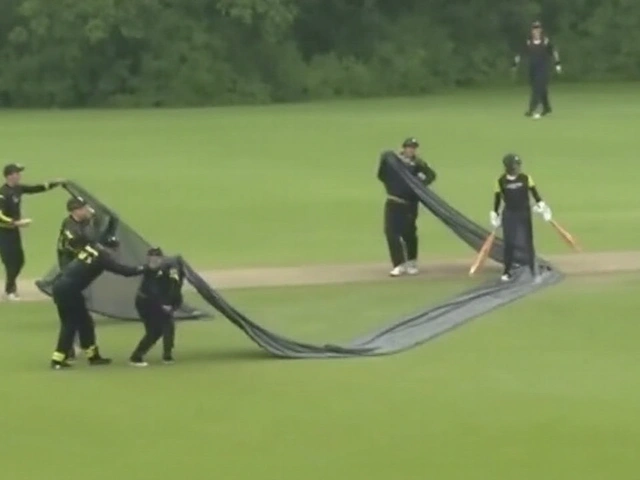
England seals 2-0 T20 series win over Ireland
England wrapped up a 2‑0 triumph in their three‑match England T20 series with Ireland on Sunday at Malahide, Dublin, sealing the victory with a comfortable six‑wicket chase. The win came after rain forced the second game to be abandoned without a ball bowled, leaving the outcome to be decided by the first and third encounters.
The series opened on Wednesday with England posting a solid total before Phil Salt smashed an unbeaten 89 off 55 balls. His aggressive start set the tone, and the middle order added crucial runs to steer England to a four‑wicket win with 14 balls left. Salt’s innings not only gave England a lead but also highlighted the batting depth that the side now enjoys in the shortest format.
Friday’s match never got underway as heavy showers rolled across the Irish coast. The downpour lasted the entire scheduled slot, prompting officials to call off the game and award England a series‑winning lead. While the rain‑out was disappointing for spectators, it underscored the reality of Ireland’s weather‑prone venues and added an extra layer of urgency to the final showdown.
In the decisive third match, Ireland posted 154‑8 in their 20 overs. Gareth Delany top‑scored with a crisp 48 from 29 balls, anchoring the innings with a mix of boundary hitting and controlled running. He was supported by quick contributions from the lower order, but the Irish side fell short of a more imposing total.
- Gareth Delany – 48 (29 balls)
- Harry Tector – 32 (22 balls)
- Andy Balbirnie – 24 (18 balls)
England’s chase was paced by a blistering blitz at the top of the order. Jordan Cox arrived at the crease after an early wicket and unleashed a rapid 55 off just 35 balls, his powerplay innings featuring six fours and three sixes. He set up a solid platform for the middle order, who kept the scoreboard ticking.
- Jordan Cox – 55 (35 balls)
- Tom Banton – 37* (26 balls, unbeaten)
- Eoin Morgan – 12 (8 balls)
Tom Banton’s unbeaten 37 from 26 deliveries capped the chase, as England reached the target with 17 balls to spare, finishing on 155‑4. The partnership between Cox and Banton proved decisive, turning potential pressure into a steady run‑flow that left the Irish bowlers searching for answers. England’s bowlers had also done their part earlier, with Adil Rashid claiming two wickets for just 16 runs, while Mark Wood’s disciplined spell kept the run‑rate in check.
The series win reinforces England’s standing as a potent force in T20 cricket. With the ICC T20 World Cup on the horizon, the squad’s blend of experienced campaigners and emerging talent provides a healthy balance. The performances of Salt, Cox and Banton suggest that England’s batting order can adapt to varied conditions, while the spin and pace options have shown they can restrict opposition totals.
For Ireland, the series exposed both promise and areas for improvement. Delany’s aggressive inning highlighted the potential of Ireland’s middle order, and the team’s ability to post competitive totals against a top side is an encouraging sign. However, the inability to convert those starts into a defendable score will be a focal point as they prepare for upcoming series against other European opponents.
Fans in both nations turned out in good numbers, with the Malahide crowd creating a vibrant atmosphere despite the earlier rain disruption. Television ratings indicated a healthy appetite for T20 cricket, and the series is likely to influence future scheduling decisions, especially regarding venue selection during the rainy season.
Looking ahead, England will shift focus to their next international commitments, using the momentum from this series to fine‑tune strategies ahead of the global tournament. Ireland, meanwhile, will regroup and aim to build on the lessons learned, hoping to climb the rankings and secure more wins against higher‑ranked teams in the months to come.





The series victory, while impressive on paper, conceals a glaring over‑reliance on the top‑order fireworks. Salt’s 89 was a masterclass, yet the middle‑order’s thin rescue in the final chase suggests a fragile batting core. The rain‑shortened second game offered England an unearned cushion, turning a potential swing into a foregone conclusion. England’s bowlers performed adequately, but Rashid’s two‑wicket haul was more a statistical footnote than a decisive blow. If the team intends to dominate at the World Cup, they must address the lack of depth beyond the first five overs. The current setup may crumble under sustained pressure from a more disciplined side. Moreover, the Irish transition from a competitive 154 to a sub‑par total highlighted England’s superior fielding discipline. In short, the series win is less a testament to superiority and more a reminder of the gaps that still linger.
England nailed the win its a solid showing but the rain drama added a weird flavor to the series the powerplay blitz from Cox was pure fire and Banton’s finish was smooth no doubt the Irish still got a taste of the game though they cant keep up with the pace
What a great series for England! Their batters really stepped up and the crowd at Malahide was buzzing. I think this win will give the lads a confidence boost ahead of the World Cup. The Irish put up a fight, especially Delany’s quick 48, but they just wont find the consistency yet. Keep your head up and keep pushin, you’ll get there soon.
Totally thrilled to see England cruising through the series 😊 The way Cox exploded in the power‑play was just exhilarating, and Banton’s cool finish was the cherry on top. Ireland gave it their all, but the English side just had that extra spark when it mattered most. Can’t wait to see how they carry this momentum into the upcoming tournaments!
England’s performance in the series demonstrates a commendable balance between aggression and composure. The batting line‑up delivered when required and the bowlers executed their plans effectively. While Ireland showed potential, England’s consistency proved decisive. The team should continue to refine its strategies as they approach the World Cup.
Fun fact: Phil Salt’s 89 off 55 balls gave England a net‑run rate boost that proved crucial after the rain‑affected match. If you’re tracking player form, keep an eye on how Cox adapts his strike‑rate in different conditions – he’s become a real X‑factor. Also, consider the impact of the venue; Malahide’s pitch tends to favour pace early on, which England exploited nicely.
Ah, the sweet symphony of rain washing away any chance for Ireland to mount a comeback – truly a masterpiece of meteorological interference. England, ever the graceful dancers, twirled around the puddles and claimed victory as if it were rehearsed. One can only marvel at how the heavens conspired to write this flawless script, complete with a flawless six‑wicket chase that left the Irish bowlers bewildered and the spectators drenched in awe.
Rainy day cricket is always a buzzkill.
The England T20 triumph, when examined through a multi‑dimensional analytical lens, reveals a cascade of intertwined variables that merit rigorous dissection. Firstly, the statistical outlier presented by Phil Salt's blistering 89 underscores not merely individual brilliance but also the strategic orchestration of the top order to dominate the power‑play. Secondly, the rain‑induced abandonment of the second fixture introduces an element of stochasticity that complicates any deterministic assessment of team form. Moreover, Jordan Cox's 55 off 35 balls serves as a microcosm of contemporary batting philosophy, where aggression is calibrated against risk in a manner reminiscent of the shortest formats' evolution over the past decade. In addition, the spin component, epitomized by Adil Rashid’s economical two‑wicket spell, illustrates a nuanced balance between containment and wicket‑taking that cannot be ignored. Furthermore, the psychological impact of securing an unassailable series lead before the final match cannot be overstated; it likely contributed to the relaxed yet effective execution displayed by the English side in the chase. The Irish performance, while commendable in certain facets, exposes structural vulnerabilities, particularly in their inability to convert solid starts into defendable totals, a pattern that aligns with their historical struggles in high‑pressure T20 encounters. From a comparative standpoint, England's adaptability across varying pitch conditions, as evidenced by their seamless transition from the Dublin surface to the more pace‑friendly venues anticipated in the World Cup, augurs well for their future prospects. Additionally, the role of fielding standards, often an overlooked metric, manifested in crucial run‑saving efforts that complemented the bowling unit's disciplined approach. The aggregate data points, when plotted against a backdrop of recent international T20 performances, position England among the elite, yet simultaneously highlight areas-such as middle‑order depth under pressure-that demand strategic reinforcement. In conclusion, while the series outcome appears decisive on the surface, a granular interrogation of each component reveals a tapestry of strengths, weaknesses, and stochastic influences that together compose the intricate narrative of England's current T20 trajectory.
One must acknowledge that the Irish side, despite their zealous attempts, were perennially outclassed by the English quartet's superior technical acumen and tactical nous, a disparity made glaringly apparent by the relentless onslaught of Cox's power‑play artillery.
Behold the spectacle of England's conquest-a veritable ballet of bat and ball, where each stroke sang a ballad of dominance, and every wicket fell like a tragic ode to Irish hopes; the rain, that fickle playwright, merely set the stage for a drama wherein the English heroes emerged unscathed, their triumph echoing through the annals of cricketing lore.
Great series for England, and a solid effort from Ireland too. If you’re following the matches, you’ll notice that the key to England’s success was their flexible batting order, which allowed them to rotate strike efficiently. For anyone interested in the upcoming World Cup, keeping an eye on how these players adapt to different pitches will be crucial.
England’s win is a testament to strategic brilliance and executional precision
While many celebrate England’s tidy 2‑0 series sweep, it’s worth remembering that Ireland’s competitive spirit and occasional flashes of brilliance suggest that the gap between the sides may not be as wide as the scoreboard implies.